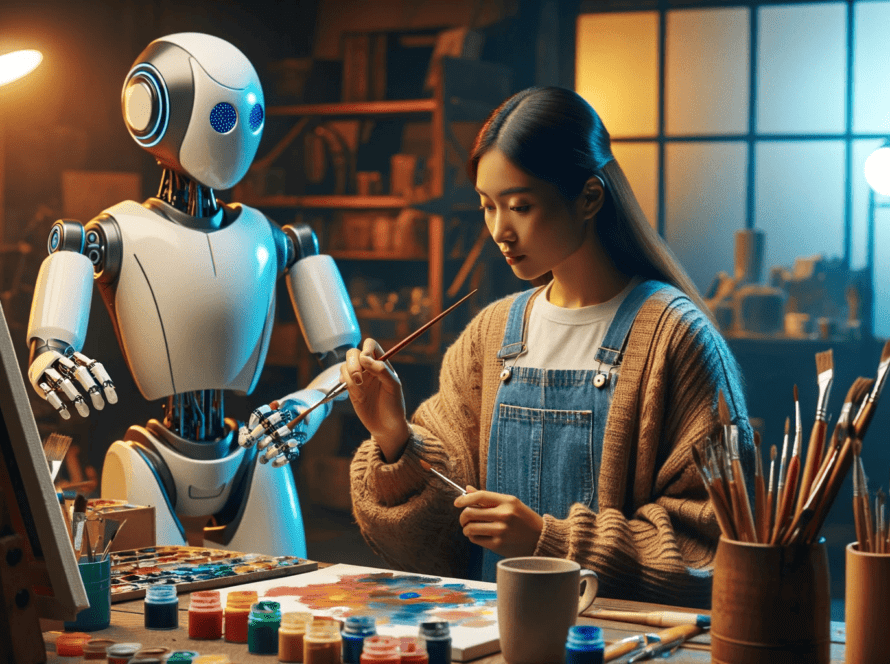A fast scan of the headlines makes it seem to be generative synthetic intelligence is in all places nowadays. Actually, a few of these headlines may very well have been written by generative AI, like OpenAI’s ChatGPT, a chatbot that has demonstrated an uncanny means to provide textual content that appears to have been written by a human.
However what do individuals actually imply after they say “generative AI?”
Earlier than the generative AI growth of the previous few years, when individuals talked about AI, sometimes they had been speaking about machine-learning fashions that may be taught to make a prediction primarily based on information. As an illustration, such fashions are skilled, utilizing thousands and thousands of examples, to foretell whether or not a sure X-ray reveals indicators of a tumor or if a specific borrower is prone to default on a mortgage.
Generative AI could be considered a machine-learning mannequin that’s skilled to create new information, quite than making a prediction a couple of particular dataset. A generative AI system is one which learns to generate extra objects that seem like the info it was skilled on.
“With regards to the precise equipment underlying generative AI and different varieties of AI, the distinctions is usually a little bit blurry. Oftentimes, the identical algorithms can be utilized for each,” says Phillip Isola, an affiliate professor {of electrical} engineering and pc science at MIT, and a member of the Pc Science and Synthetic Intelligence Laboratory (CSAIL).
And regardless of the hype that got here with the discharge of ChatGPT and its counterparts, the expertise itself isn’t model new. These highly effective machine-learning fashions draw on analysis and computational advances that return greater than 50 years.
A rise in complexity
An early instance of generative AI is a a lot easier mannequin referred to as a Markov chain. The approach is known as for Andrey Markov, a Russian mathematician who in 1906 launched this statistical technique to mannequin the habits of random processes. In machine studying, Markov fashions have lengthy been used for next-word prediction duties, just like the autocomplete perform in an electronic mail program.
In textual content prediction, a Markov mannequin generates the following phrase in a sentence by trying on the earlier phrase or just a few earlier phrases. However as a result of these easy fashions can solely look again that far, they aren’t good at producing believable textual content, says Tommi Jaakkola, the Thomas Siebel Professor of Electrical Engineering and Pc Science at MIT, who can also be a member of CSAIL and the Institute for Knowledge, Programs, and Society (IDSS).
“We had been producing issues means earlier than the final decade, however the main distinction right here is when it comes to the complexity of objects we are able to generate and the dimensions at which we are able to practice these fashions,” he explains.
Just some years in the past, researchers tended to deal with discovering a machine-learning algorithm that makes the very best use of a selected dataset. However that focus has shifted a bit, and lots of researchers at the moment are utilizing bigger datasets, maybe with lots of of thousands and thousands and even billions of knowledge factors, to coach fashions that may obtain spectacular outcomes.
The bottom fashions underlying ChatGPT and comparable programs work in a lot the identical means as a Markov mannequin. However one massive distinction is that ChatGPT is way bigger and extra complicated, with billions of parameters. And it has been skilled on an unlimited quantity of knowledge — on this case, a lot of the publicly accessible textual content on the web.
On this enormous corpus of textual content, phrases and sentences seem in sequences with sure dependencies. This recurrence helps the mannequin perceive minimize textual content into statistical chunks which have some predictability. It learns the patterns of those blocks of textual content and makes use of this data to suggest what may come subsequent.
Extra highly effective architectures
Whereas greater datasets are one catalyst that led to the generative AI growth, quite a lot of main analysis advances additionally led to extra complicated deep-learning architectures.
In 2014, a machine-learning structure referred to as a generative adversarial community (GAN) was proposed by researchers on the College of Montreal. GANs use two fashions that work in tandem: One learns to generate a goal output (like a picture) and the opposite learns to discriminate true information from the generator’s output. The generator tries to idiot the discriminator, and within the course of learns to make extra practical outputs. The picture generator StyleGAN is predicated on these kind of fashions.
Diffusion fashions had been launched a 12 months later by researchers at Stanford College and the College of California at Berkeley. By iteratively refining their output, these fashions be taught to generate new information samples that resemble samples in a coaching dataset, and have been used to create realistic-looking photos. A diffusion mannequin is on the coronary heart of the text-to-image technology system Steady Diffusion.
In 2017, researchers at Google launched the transformer structure, which has been used to develop giant language fashions, like people who energy ChatGPT. In pure language processing, a transformer encodes every phrase in a corpus of textual content as a token after which generates an consideration map, which captures every token’s relationships with all different tokens. This consideration map helps the transformer perceive context when it generates new textual content.
These are only some of many approaches that can be utilized for generative AI.
A variety of functions
What all of those approaches have in widespread is that they convert inputs right into a set of tokens, that are numerical representations of chunks of knowledge. So long as your information could be transformed into this customary, token format, then in principle, you can apply these strategies to generate new information that look comparable.
“Your mileage may range, relying on how noisy your information are and the way tough the sign is to extract, however it’s actually getting nearer to the best way a general-purpose CPU can absorb any form of information and begin processing it in a unified means,” Isola says.
This opens up an enormous array of functions for generative AI.
As an illustration, Isola’s group is utilizing generative AI to create artificial picture information that might be used to coach one other clever system, akin to by educating a pc imaginative and prescient mannequin acknowledge objects.
Jaakkola’s group is utilizing generative AI to design novel protein buildings or legitimate crystal buildings that specify new supplies. The identical means a generative mannequin learns the dependencies of language, if it’s proven crystal buildings as a substitute, it could actually be taught the relationships that make buildings steady and realizable, he explains.
However whereas generative fashions can obtain unimaginable outcomes, they aren’t your best option for all sorts of knowledge. For duties that contain making predictions on structured information, just like the tabular information in a spreadsheet, generative AI fashions are typically outperformed by conventional machine-learning strategies, says Devavrat Shah, the Andrew and Erna Viterbi Professor in Electrical Engineering and Pc Science at MIT and a member of IDSS and of the Laboratory for Data and Determination Programs.
“The best worth they’ve, in my thoughts, is to turn out to be this terrific interface to machines which might be human pleasant. Beforehand, people needed to speak to machines within the language of machines to make issues occur. Now, this interface has discovered speak to each people and machines,” says Shah.
Elevating crimson flags
Generative AI chatbots at the moment are being utilized in name facilities to discipline questions from human clients, however this utility underscores one potential crimson flag of implementing these fashions — employee displacement.
As well as, generative AI can inherit and proliferate biases that exist in coaching information, or amplify hate speech and false statements. The fashions have the capability to plagiarize, and may generate content material that appears prefer it was produced by a selected human creator, elevating potential copyright points.
On the opposite aspect, Shah proposes that generative AI might empower artists, who might use generative instruments to assist them make artistic content material they won’t in any other case have the means to provide.
Sooner or later, he sees generative AI altering the economics in lots of disciplines.
One promising future course Isola sees for generative AI is its use for fabrication. As a substitute of getting a mannequin make a picture of a chair, maybe it might generate a plan for a chair that might be produced.
He additionally sees future makes use of for generative AI programs in growing extra usually clever AI brokers.
“There are variations in how these fashions work and the way we expect the human mind works, however I feel there are additionally similarities. We have now the power to assume and dream in our heads, to provide you with fascinating concepts or plans, and I feel generative AI is without doubt one of the instruments that may empower brokers to try this, as properly,” Isola says.



